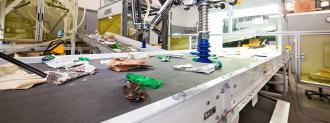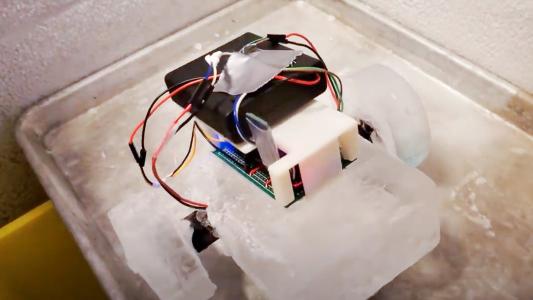Updated, 01/26/21, 4:05 PM ET: This article was updated to correct the name of one of AMP Robotics’ clients.
Every week or two, you might drag a bin full of recyclables to the curb alongside your trash, thinking you’re doing your part to help solve the world’s waste crisis — the United States alone generates nearly 300 million tons of trash each year.
But before your recyclables can be turned into new products, though, they have to be manually sorted by workers at a recycling center.
Those centers can’t afford to hire as many people as are needed to sort all the recyclables they receive every day, though, so your discarded bottles and cans could still end up going to a landfill.
Even if the centers could afford it, not many people want to spend 40 hours a week sorting through trash — many new hires quit just hours after starting the job, according to Brent Bell of WM Recycle America, a recycling services company.
Now, Colorado-based startup AMP Robotics has come up with a solution to this problem: an AI-powered recycling robot that can sort recyclables twice as quickly as its human counterparts — and it never gets burned out by the job.
A Recycling Robot
AMP’s recycling robot, which looks like a large hollow box, hangs on a steel frame over a conveyor belt at a recycling center. A camera feeds a stream of the recyclables passing below the bot to an AI software program. The AI is trained to recognize different types of items with 99% accuracy.
“It perceives objects that are potentially bent, deformed, folded, crushed, just like you or I would if we were looking at the materials in these sorting facilities,” Rob Writz, AMP’s director of business development, explained. “It’s using the same kind of perception and logic as a human being.”
Once the software recognizes an item, the recycling robot can then use a suction cup on one of its three hands to pick up the recyclable and place it in the appropriate bin — milk jugs go with plastics, soda cans with aluminum, etc.
Unlike human workers, AMP’s robot can also provide comprehensive data on the recyclables — it keeps track of every item it recognizes and can share that list at the end of each day.
That information could be useful for waste reduction efforts.
Looking Ahead
Recycling centers can lease AMP’s recycling robot for less than $6,000 per month, and according to the startup, doing so could save them up to 70% on their sorting costs.
The system can be installed in just 48 hours, and AMP has already deployed hundreds of the robots at recycling centers across three continents and 20 states.
It’s using the same kind of perception and logic as a human being.
Rob Writz
In April 2020, the company announced that its robots had sorted one billion recyclables in the past 12 months, and before the end of the year, Waste Connections ordered 24 of the robots, marking the startup’s biggest contract to-date.
2021 is already off to a good start, too — on January 4, AMP announced that it had secured another $55 million in funding, meaning its efforts to keep recyclables out of landfills will continue well into the future.
We’d love to hear from you! If you have a comment about this article or if you have a tip for a future Freethink story, please email us at [email protected].






